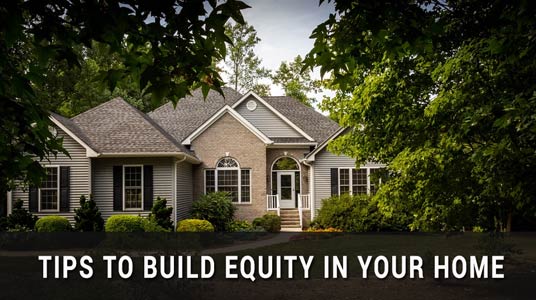
5 Tips for Building Equity in Your Home
The difference between the principal balance of all existing loans and current market value of your home is regarded as equity. It should come as no surprise that most homeowners want to gain lots of equity.
Improving your home’s equity is crucial because it can be accessed if necessary by applying for a home equity loan or an equity line of credit. In order to raise the amount of equity, your home’s value must increase, your mortgage debt needs to decrease, or both are required. Here are additional methods in order to do that.
Building Equity by Improving the Property
Remodeling and home improvement projects can really build your equity. If you want to upgrade the flooring, change light fixtures, remodel an outdated bathroom, kitchen, bedroom, new cabinets, etc it could be worthwhile. The average upgrade pays you back 64%.
A beautiful front yard, a fabulous porch, and gorgeously landscaped walkways and driveway are always appealing. If you aren’t remodeling with the purpose of selling your home soon, it’s essential to consider how much the improvement will better your living condition at home.
Refinance to a Shorter-Term Loan
Selecting or refinancing to a shorter loan term can help increase your equity. Generally, with 15-year mortgages, a larger portion of your payments is applied to the principal versus the interest and you’ll have a lower interest rate than a 30-year fixed.
It’s worthwhile to know that short-term mortgages have a higher payment, so you should figure out if your budget can handle the larger payments. Avoid refinancing to pull cash out because that will eat into your equity.
Pay More on Your Mortgage
Your mortgage payments take care of your principal and interest payment on the loan. Basically, a larger portion of your payment is applied to mortgage interest in the beginning years of the loan and more is applied to principal over time.
Therefore, if you can afford to pay more than is required, you’ll reduce your existing loan balance quicker, which boosts your equity. You’ll want to confirm that the extra money you pay is applied to the principal, not interest.
There are a few ways to pay extra money on your mortgage including:
adding a fixed amount $(50, $100, $500,$1,000 etc.) to your payments every month, changing to a biweekly mortgage plan setting up extra payments at regular intervals, and using extra money from renting out part or all of your property, and using the rent you receive from your tenant’s tax refunds, family gifts, and inheritances.
Make a Larger Down Payment
Prospective homeowners can have immediate equity with a larger the down payment than five or ten percent. The more equity you have to begin with the better off you feel.
An often recommended suggestion by financial experts is to put down a minimum of 20%, so you can avoid paying private mortgage insurance, also called PMI. Everyone’s financial goals and current situation may not allow to put 20-percent own. Determine what is best for you and your situation.
Wait for Your Home’s Value to Rise
If building equity in your home is not a priority, you can simply be patient and wait for neighborhood prices to rise. Local market conditions fluctuate and will definitely affect the value of your home in a positive or negative way.
When home demand increases in your area, your home value will also go up. On the other hand, if the housing market slows in Orange County, your home’s value may decline and you could experience less equity. These market fluctuations are mostly not in your control, but they’re worth understanding.
Fed policy to help keep mortgage rates low
The FOMC meeting on September 15-16 helped clarify to consumers and homeowners nationwide that the Fed’s will keep interest rates low until 2023. This means with low interest rates, home demand should remain strong in California and other popular areas across the country.